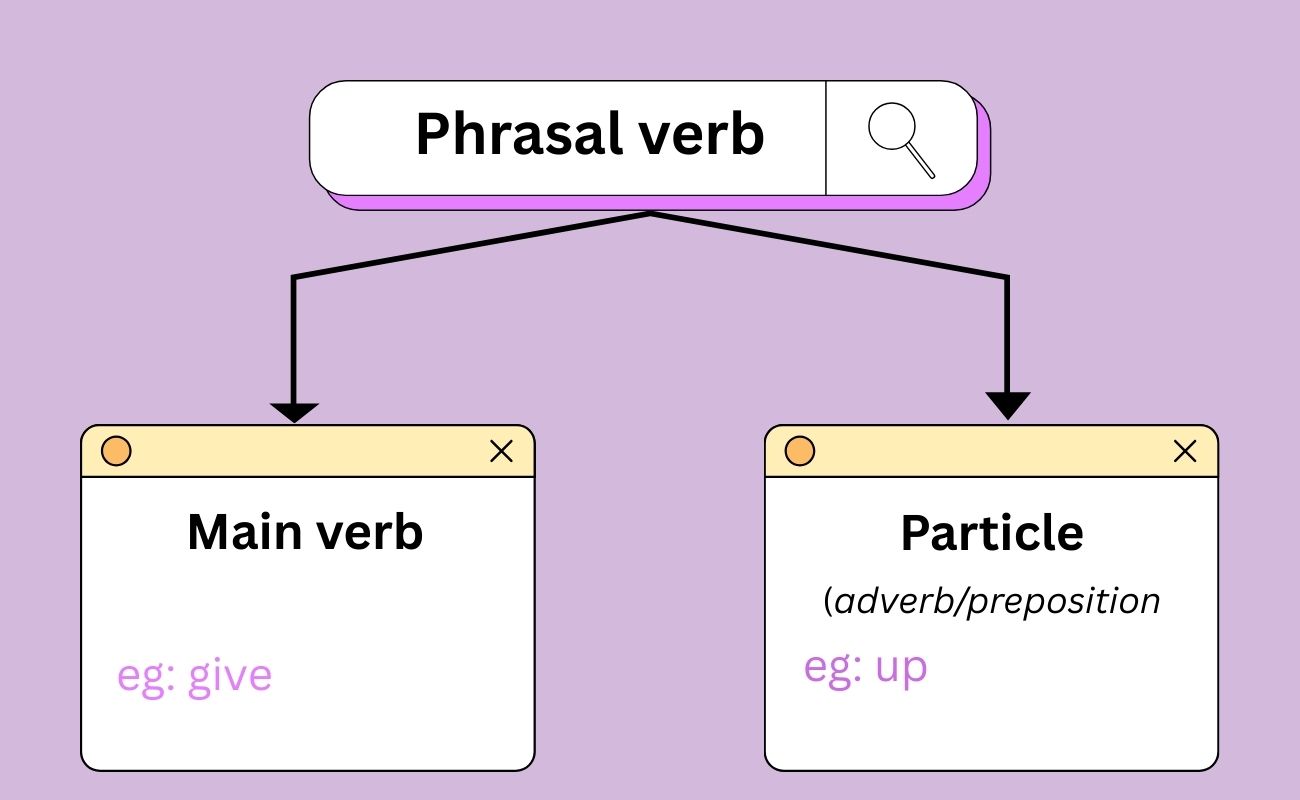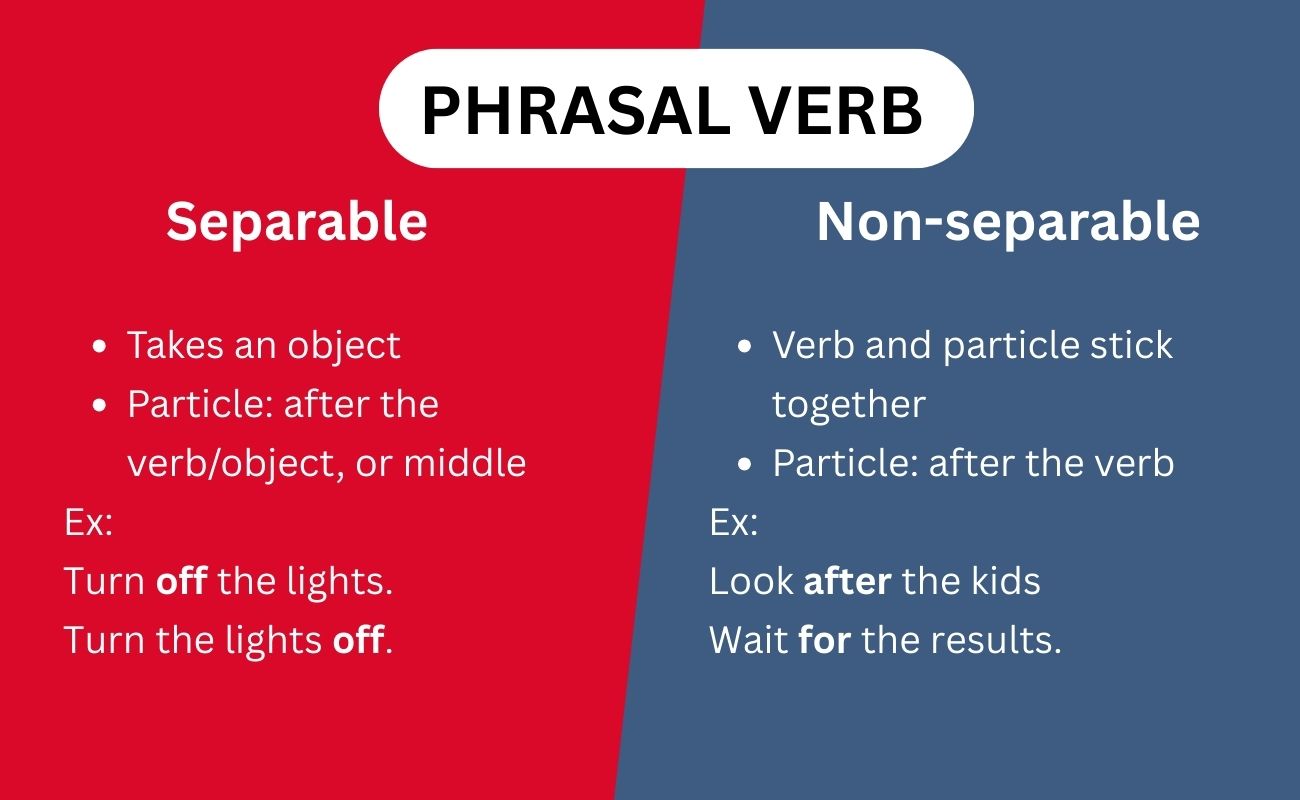What Are Phrasal Verbs?

A phrasal verb is a combination of a main verb and a particle, usually an adverb or a preposition, whose meaning changes completely from the base verb. In other words, the sum is greater than its parts. For example, give up doesn’t mean “give” + “up” literally; it means “to quit” or “to stop trying.”
Phrasal verbs matter because they’re woven into every layer of English: from casual conversations and workplace emails to TV scripts and even formal speeches. Native speakers use them without thinking, and mastering them can:
- Sharpen your listening skills so you instantly catch the intended meaning.
- Make your speech and writing sound natural, not “textbook.”
- Grow your vocabulary without memorizing endless isolated words.
Once you understand how common phrasal verbs work, you will start noticing them everywhere. Once you can use them confidently, you will move from simply understanding English to truly living it.
Types of Phrasal Verbs
Not all phrasal verbs play by the same rules. Some let you move their parts around, while others refuse to be split up. In English, these two types are known as separable and non-separable phrasal verbs.

Separable phrasal verb
A separable phrasal verb takes an object, and the particle can be placed either right after the verb or after the object. Both positions work, but there’s one golden rule: if the object is a pronoun, it must go in the middle.
Take turn off as an example:
- Turn off the lights.
- Turn the lights off.
The same applies to pick up:
- I’ll pick up my friend at the station.
- I’ll pick my friend up at the station.
However, if the object is a pronoun, it must go in the middle:
- Turn it off. (Correct)
- Turn off it. (Incorrect)
Non-separable phrasal verbs
With non-separable phrasal verbs, the verb and particle stick together like glue. The object always comes after the whole expression; you can’t insert anything in between.
For example:
- Look after the kids while I’m out.
- We’re waiting for the results.
You can’t split these: look the kids after or wait the results for would sound unnatural and incorrect.
Once you know whether a phrasal verb is separable or not, you’ll not only avoid common grammar mistakes but also make your sentences flow more like a native speaker’s.
150+ Most Common Phrasal Verbs in English
Below is a curated list of 150+ of the most common phrasal verbs, organized from A to W, with clear meanings in Vietnamese and practical examples to help you remember them.

| No | Letter | Phrasal Verb | Meaning |
| 1 | A | add up | to total; to make sense logically |
| 2 | agree with | to have the same opinion as someone | |
| 3 | allow for | to take into consideration | |
| 4 | apply for | to make a formal request for something | |
| 5 | ask for | to request or demand something | |
| 6 | ask out | to invite someone on a date | |
| 7 | B | back up | to make a copy of data; to support someone |
| 8 | bear with | to be patient with someone or something | |
| 9 | blow up | to explode; to become very angry | |
| 10 | break down | to stop functioning (machines); to become very upset | |
| 11 | break in | to enter a building illegally | |
| 12 | break into | to enter a place forcibly | |
| 13 | break out | to start suddenly (war, fire, disease) | |
| 14 | break through | to make a breakthrough | |
| 15 | break up | to end a relationship; to disperse | |
| 16 | bring about | to cause something to happen | |
| 17 | bring forward | to change to an earlier date; to propose | |
| 18 | bring up | to raise a child; to mention a topic | |
| 19 | build up | to accumulate; to develop | |
| 20 | burn out | to become exhausted due to overwork | |
| 21 | burn up | to be destroyed by fire; to make someone very angry | |
| 22 | C | call back | to return a phone call |
| 23 | call off | to cancel something | |
| 24 | call on/upon | to formally ask or demand | |
| 25 | calm down | to become or make someone calmer | |
| 26 | carry on | to continue doing something | |
| 27 | carry out | to perform or complete a task | |
| 28 | catch up (with) | to reach the same level or standard as someone | |
| 29 | check in | to register upon arrival | |
| 30 | check out | to leave after paying; to investigate | |
| 31 | cheer up | to make or become happier | |
| 32 | come across | to find or meet by chance | |
| 33 | come back | to return | |
| 34 | come in | to enter | |
| 35 | come on | to make progress; to hurry up | |
| 36 | come out | to be published; to become known | |
| 37 | come up (with) | to think of (an idea, plan) | |
| 38 | count on | to rely or depend on someone or something | |
| 39 | cut back (on) | to reduce something | |
| 40 | cut off | to stop the supply or connection | |
| 41 | cut out | to remove or stop doing something | |
| 42 | D | deal with | to handle or manage something |
| 43 | die out | to become extinct | |
| 44 | dig into | to investigate or research deeply | |
| 45 | dress up | to wear formal or fancy clothes | |
| 46 | drop by | to visit briefly and informally | |
| 47 | drop off | to take someone to a place; to decrease | |
| 48 | drop out | to leave school or a course before finishing | |
| 49 | E | eat out | to have a meal in a restaurant |
| 50 | end up | to reach a final place or situation | |
| 51 | engage in | to participate in something | |
| 52 | enter into | to start a formal agreement or discussion | |
| 53 | explain away | to make an excuse for something | |
| 54 | eye up | to look at someone with interest | |
| 55 | F | fall apart | to break into pieces; to fail completely |
| 56 | fall back on | to use as a last resort | |
| 57 | fall behind | to fail to keep up | |
| 58 | fall for | to be deceived by; to fall in love with | |
| 59 | fall out | to have a disagreement | |
| 60 | fall through | to fail to happen | |
| 61 | figure out | to understand or solve something | |
| 62 | fill in | to complete a form; to do a job temporarily | |
| 63 | find out | to discover information | |
| 64 | finish off | to complete or bring to an end | |
| 65 | G | get along (with) | to have a friendly relationship with someone |
| 66 | get around | to move from place to place; to be circulated or spread | |
| 67 | get away | to escape or go on vacation | |
| 68 | get back | to return to a place | |
| 69 | get by | to manage to survive or cope | |
| 70 | get in | to enter or arrive somewhere | |
| 71 | get off | to leave a vehicle or avoid punishment | |
| 72 | get on | to board a vehicle or make progress | |
| 73 | get over | to recover from something unpleasant | |
| 74 | H | hand back | to return something to its owner |
| 75 | hand in | to submit something | |
| 76 | hand out | to distribute something | |
| 77 | hang on | to wait or hold tightly | |
| 78 | hang out | to spend time relaxing with others | |
| 79 | hang up | to end a phone call | |
| 80 | hold back | to restrain or stop something | |
| 81 | hold on | to wait for a short time | |
| 82 | hold up | to delay or rob using force | |
| 83 | K | keep away (from) | to stay at a distance from something |
| 84 | keep back | to withhold or not reveal something | |
| 85 | keep on | to continue doing something | |
| 86 | keep up (with) | to move or progress at the same rate as someone or something | |
| 87 | L | lay off | to dismiss someone from their job |
| 88 | leave out | to omit or exclude something | |
| 89 | let down | to disappoint someone | |
| 90 | let in | to allow someone to enter | |
| 91 | let off | to pardon or release someone from a duty or punishment | |
| 92 | M | make for | to move toward a place |
| 93 | make out | to see, hear, or understand something with difficulty | |
| 94 | make up | to invent a story; to reconcile; to apply cosmetics | |
| 95 | mix up | to confuse or mistake one thing for another | |
| 96 | P | pass away | to die |
| 97 | pass out | to lose consciousness or distribute something | |
| 98 | pay back | to return money owed or retaliate | |
| 99 | pick out | to choose or select something | |
| 100 | point out | to indicate or draw attention to something | |
| 101 | put away | to store something in its proper place | |
| 102 | put off | to postpone something | |
| 103 | put on | to dress oneself in clothing or gain weight | |
| 104 | put out | to extinguish something | |
| 105 | put up with | to tolerate or endure something | |
| 106 | R | rely on | to depend or trust in someone or something |
| 107 | run after | to chase someone or something | |
| 108 | run away | to escape or flee | |
| 109 | run into | to meet someone unexpectedly | |
| 110 | run out (of) | to have none left of something | |
| 111 | run over | to drive over something or rehearse quickly | |
| 112 | S | set off | to begin a journey or trigger something |
| 113 | set out | to start doing something or arrange a plan | |
| 114 | set up | to establish or arrange something | |
| 115 | show off | to display something proudly | |
| 116 | show up | to appear or arrive | |
| 117 | shut down | to close or stop operating | |
| 118 | shut up | to stop talking | |
| 119 | sort out | to organize or resolve a problem | |
| 120 | speak up | to speak louder or express an opinion | |
| 121 | stand by | to support or be ready to act | |
| 122 | stand out | to be noticeable or prominent | |
| 123 | stand up for | to defend or support someone or something | |
| 124 | stick to | to adhere to or follow something | |
| 125 | switch off | to turn something off | |
| 126 | switch on | to turn something on | |
| 127 | T | take after | to resemble a family member |
| 128 | take away | to remove or subtract something | |
| 129 | take back | to retract a statement or reclaim something | |
| 130 | take off | to depart (aircraft) or remove clothing | |
| 131 | take on | to accept responsibility for something | |
| 132 | take out | to remove something or invite someone out | |
| 133 | take over | to assume control of something | |
| 134 | take up | to start an activity or occupy space/time | |
| 135 | talk over | to discuss something | |
| 136 | tear down | to demolish or destroy | |
| 137 | think over | to consider something carefully | |
| 138 | throw away | to dispose of something | |
| 139 | throw up | to vomit or abandon something | |
| 140 | turn around | to change direction or improve a situation | |
| 141 | turn down | to refuse something or lower the volume | |
| 142 | turn into | to transform into something | |
| 143 | turn off | to switch off or cause dislike | |
| 144 | turn on | to switch on or excite someone | |
| 145 | turn up | to appear or increase volume | |
| 146 | W | wake up | to stop sleeping |
| 147 | watch out | to be careful or vigilant | |
| 148 | wear out | to exhaust or damage through use | |
| 149 | work out | to exercise or solve a problem | |
| 150 | wrap up | to cover or finish something | |
| 151 | write down | to record something on paper |
Learning them alongside 100+ common collocations will help you spot natural word patterns and make your English flow more smoothly.
How to Learn and Remember Phrasal Verbs Effectively

Ever notice how some phrasal verbs stick in your head after hearing them once, while others seem to vanish the moment you look away? The difference often comes down to how you meet them, use them, and revisit them. Here’s how to make that process work in your favour:
- Grouping by main verb: Put all variations under one roof, like get along, get over, and get by. You’ll start spotting how the particle changes the meaning.
- Using visual aids: A mind map or a simple flashcard can link meaning, image, and particle in a way that sticks.
- Practicing in context: Slip them into your sentences, short dialogues, or journal entries. If you use them, you keep them.
- Listening to authentic usage: Films, interviews, casual podcasts, and even song lyrics are full of common phrasal verbs in their natural habitat.
- Applying spaced repetition: Spaced-repetition apps like Anki or Quizlet keep the ones you’ve learned from fading away.
Over time, you’ll find that phrasal verbs stop being items on a list and start becoming a natural part of your spoken and written English.
Conclusion
Mastery of common phrasal verbs is a turning point in achieving fluent English. From casual chats to professional settings, they give your language the rhythm and authenticity native speakers use instinctively. Keep exploring, keep practising, and you’ll find each new phrase opens another door to confident communication.
For more in-depth guides and practical tips, visit Gurulango and take your English further.